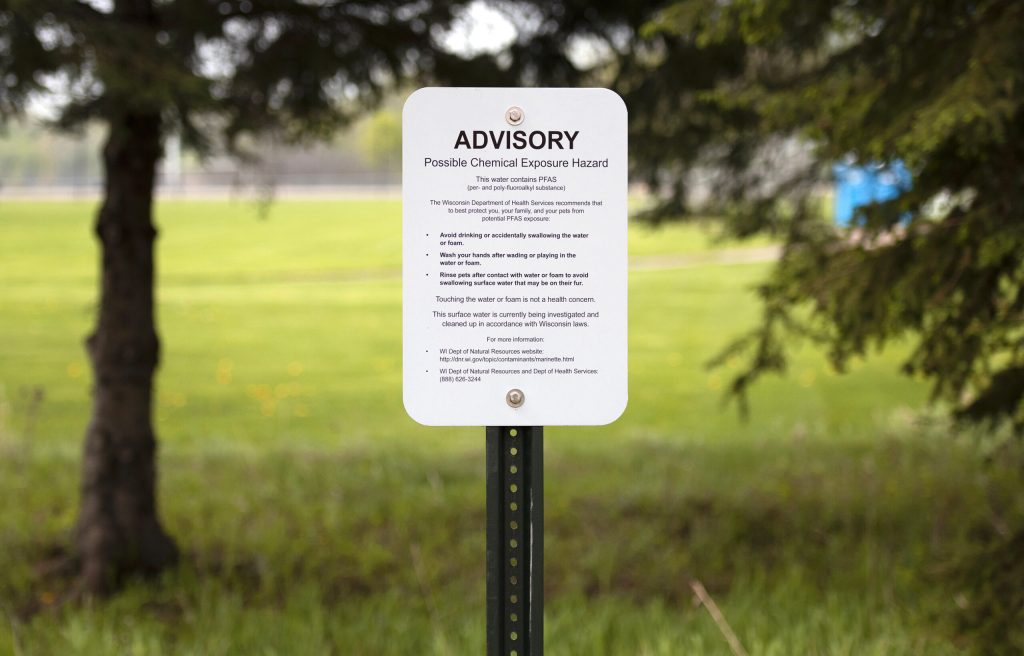UW-Madison to Open PFAS Center
US Rep. Mark Pocan secured $963,000 federal funding for Center of Excellence in PFAS Environmental Science.

A sign at Marinette High School warns of PFAS contamination in water that runs through the school’s campus Thursday, May 20, 2021. Angela Major/WPR
A new center at the University of Wisconsin-Madison will focus on studying PFAS and finding solutions to environmental contamination by the chemicals.
The new center will be launched with federal funding announced last week. Scientists said they hope to be able to identify PFAS they currently can’t measure, and find ways to reverse or stop environmental damage caused by the substances sometimes called “forever chemicals.”
U.S. Rep. Mark Pocan announced the $963,000 appropriation during an event at the university last week. The money was included in the most recent budget passed by Congress.
The Center of Excellence in PFAS Environmental Science will be housed at UW-Madison’s Water Sciences and Engineering Lab. Much of the funding will go toward the purchase of a mass spectrometer, which will allow researchers to study more PFAS chemicals.
Per- and polyfluoroalkyl chemical compounds, or PFAS, are odorless and tasteless chemicals that have been showing up in private and public water systems across the state.
“They exist in ways that make our lives easier,” said Moira Harrington, a spokesperson for the lab. “Non-stick cookware and food packaging, they’re used in stain repellent products like carpeting, or water repellent things like our clothing. The trouble is that they can move around very easily in the environment and some of the compounds don’t break down very easily.”
Standard techniques allow researchers to measure about 40 of the more than 9,000 PFAS chemicals.
Harrington said some of these chemicals seem to never break down and accumulate in the environment, while others may break down more easily.
“These new instruments will allow researchers to discern the difference between what might break down (and) what might not,” she said, and help determine how toxic the chemicals are.
Christy Remucal is the interim director of Wisconsin Sea Grant, a program that promotes the sustainable use and conservation of Wisconsin’s water resources.
“This support will allow researchers to advance actional research on PFAS. This is necessary to safeguard water quality and protect public health,” Remucal said in a statement.
The center will hire graduate and postdoctoral students to study samples of PFAS, a university spokesperson said. The funding will also increase the quantity of samples processed in the lab, which researchers said is very time consuming.
“There’s a lot of problems with PFAS in the district and across the state — quite honestly, across the country,” Pocan told WPR. “And we’ve had some legislation that’s just been moving slow, like everything in Congress. So when the university approached us about some of the projects they care about, we knew this is something that was important to many people in the district.”
A worldwide map of PFAS contamination from the Environmental Working Group shows that while PFAS contamination exists around the world, the U.S. has by far the greatest problem. The Wisconsin Department of Natural Resources also tracks statewide contamination through an interactive map.
“I’m just glad that one of the few things we actually got done in Congress was the budget bill. Maybe six months late, but we got it done,” Pocan said. “And within that legislation was this ability to help the community and the university.”
UW-Madison to open PFAS center with federal funds was originally published by Wisconsin Public Radio.
If you think stories like this are important, become a member of Urban Milwaukee and help support real, independent journalism. Plus you get some cool added benefits.
More about the PFAS Problem
- PFAS Levels in Great Lakes Fish Are Dropping - Danielle Kaeding - Feb 6th, 2026
- Gov. Evers and GOP Lawmakers Near a Deal on PFAS Pollution - Danielle Kaeding - Jan 22nd, 2026
- Gov. Evers Optimistic About Reaching Final Deal With Republican Lawmakers to Secure Release of $125 Million in Long-Awaited Pfas Investments - Gov. Tony Evers - Jan 21st, 2026
- Bipartisan Push to Tell Counties Faster When Water Tests Fail - Henry Redman - Dec 19th, 2025
- MKE County: County Seeks to Sue PFAS Producers, Oil Companies - Graham Kilmer - Dec 10th, 2025
- Wisconsin Reviewing EPA-Approved Pesticides For PFAS - Danielle Kaeding - Dec 9th, 2025
- State Nears Settlement with Johnson Controls/Tyco Over PFAS Spills - Danielle Kaeding - Dec 4th, 2025
- Senate Bill Promotes Soybean-Based Firefighting Foam to Replace PFAS - Danielle Kaeding - Dec 2nd, 2025
- Test Results Show High PFAS Levels in Wisconsin’s Landfill Runoff - Danielle Kaeding - Dec 2nd, 2025
- Wisconsin Communities Get $282 Million for Drinking Water Projects - Danielle Kaeding - Nov 19th, 2025
Read more about PFAS Problem here





















